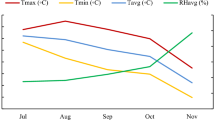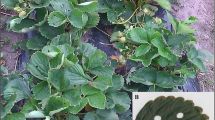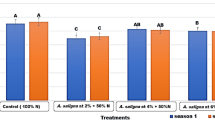Abstract
THE stem tissue of pineapple plants (Ananas comosus, var. Cayenne) contains appreciable amounts of hydroxy-cinnamic acid derivatives (‘phenolics’), largely as a quinic acid ester of p-coumaric acid1,2 and an ester of ferulic acid. These phenolics are implicated in the metabolism of the plant growth hormone, indolyl-3-acetic acid3,4.
This is a preview of subscription content, access via your institution
Access options
Subscribe to this journal
Receive 51 print issues and online access
$199.00 per year
only $3.90 per issue
Buy this article
- Purchase on Springer Link
- Instant access to full article PDF
Prices may be subject to local taxes which are calculated during checkout
Similar content being viewed by others
References
Gortner, W. A., Kent, M. J., and Sutherland, G. K., Nature, 181, 630 (1958).
Sutherland, G. K., and Gortner, W. A., Austral. J. Chem., 12, 240 (1959).
Gortner, W. A., and Kent, M., J. Biol. Chem., 204, 593 (1953).
Gortner, W. A., and Kent, M. J., J. Biol. Chem., 233, 731 (1958).
Author information
Authors and Affiliations
Rights and permissions
About this article
Cite this article
GORTNER, W. Tissue Hydroxy-cinnamic Acids and Soil Moisture Stress. Nature 197, 1316–1317 (1963). https://doi.org/10.1038/1971316a0
Issue Date:
DOI: https://doi.org/10.1038/1971316a0
Comments
By submitting a comment you agree to abide by our Terms and Community Guidelines. If you find something abusive or that does not comply with our terms or guidelines please flag it as inappropriate.



